Feeling anxious after starting a new medication isn’t rare-it’s more common than most people realize. You take a pill to help with asthma, thyroid issues, or even ADHD, and suddenly your heart races, your hands shake, or you’re overwhelmed by dread for no clear reason. It’s not in your head. It’s in the chemistry.
What Medications Can Cause Anxiety?
Not all anxiety comes from stress or trauma. Sometimes, it comes from a prescription. The most common culprits fall into a few clear categories:- Corticosteroids like prednisone and hydrocortisone-often prescribed for inflammation or autoimmune conditions-can trigger panic, irritability, and sleeplessness, especially at higher doses. One study found up to 60% of patients on long-term steroids reported mood changes, including anxiety.
- ADHD stimulants such as Adderall, Vyvanse, and Ritalin work by boosting dopamine and norepinephrine. That’s good for focus, but it can also overstimulate the nervous system. Many patients report jitteriness, racing thoughts, or sudden panic attacks after starting these meds.
- Asthma inhalers like albuterol (Proventil) and salmeterol (Serevent) cause trembling, rapid heartbeat, and nervousness because they activate the same receptors as adrenaline. These symptoms mimic a panic attack, even if you’ve never had one before.
- Thyroid meds like levothyroxine (Synthroid) are meant to balance your metabolism. But if the dose is too high, your body goes into overdrive: heart palpitations, sweating, restlessness, and constant worry. TSH levels above 4.0 mIU/L are often linked to these side effects.
- Decongestants like pseudoephedrine (Sudafed) constrict blood vessels and stimulate the nervous system. Even a single dose can make you feel wired, unable to sit still, or on edge.
- Antibiotics like fluoroquinolones (Cipro, Levaquin) have been linked to anxiety and even suicidal thoughts in some cases, though this is rare.
- Anesthesia drugs and seizure medications like valproate or gabapentin can also trigger anxiety during withdrawal or even while still taking them.
It’s not about the drug being "bad." It’s about how your body reacts to it. Some people take the same medication with no issues. Others feel like they’re falling apart. Why?
Why Does This Happen?
Your brain runs on chemicals. Serotonin, dopamine, norepinephrine-these neurotransmitters control mood, alertness, and stress response. Medications don’t just target one system. They ripple through the whole network.Corticosteroids mess with your HPA axis-the body’s main stress control center. When it’s thrown off, your body thinks it’s under constant threat. ADHD stimulants flood your brain with excitatory signals. Asthma meds mimic adrenaline. Even thyroid meds, if too high, make your entire metabolism sprint.
Genetics also play a role. A 2022 study found that people with certain variations in the CYP2D6 gene are more likely to develop anxiety from medications like SSRIs, stimulants, and beta-blockers. This enzyme helps break down drugs in the liver. If it’s slow, the drug builds up. If it’s fast, it doesn’t work well-but sometimes, that imbalance still triggers side effects.
And here’s the tricky part: if you already have anxiety, these meds can make it worse. Or worse yet, they can create symptoms that look exactly like a new anxiety disorder. That’s why doctors sometimes misdiagnose it.
How to Tell If It’s the Medication-or Something Else
The key is timing and pattern.- Did your anxiety start within days or weeks of beginning a new drug?
- Does it get worse when you take the pill and improve when you skip a dose?
- Do you feel fine when you’re not on the medication?
If yes, it’s likely medication-induced. According to the DSM-5, for a diagnosis of generalized anxiety disorder (GAD), symptoms must last at least six months and occur independently of substance use. If your anxiety only shows up when you’re on the drug, it doesn’t meet that standard.
But here’s the catch: doctors don’t always ask. A 2023 consumer survey found that 42% of patients waited over three months before their provider connected the dots. One Reddit user, after three panic attacks on prednisone, had to print a WebMD article to get her doctor to listen.
Keep a symptom journal. Note:
- When you take each medication
- When anxiety hits (within 30 minutes? 2 hours?)
- How intense it is (1-10 scale)
- What you were doing when it started
This isn’t just for you. It’s your best tool to show your doctor what’s really going on.
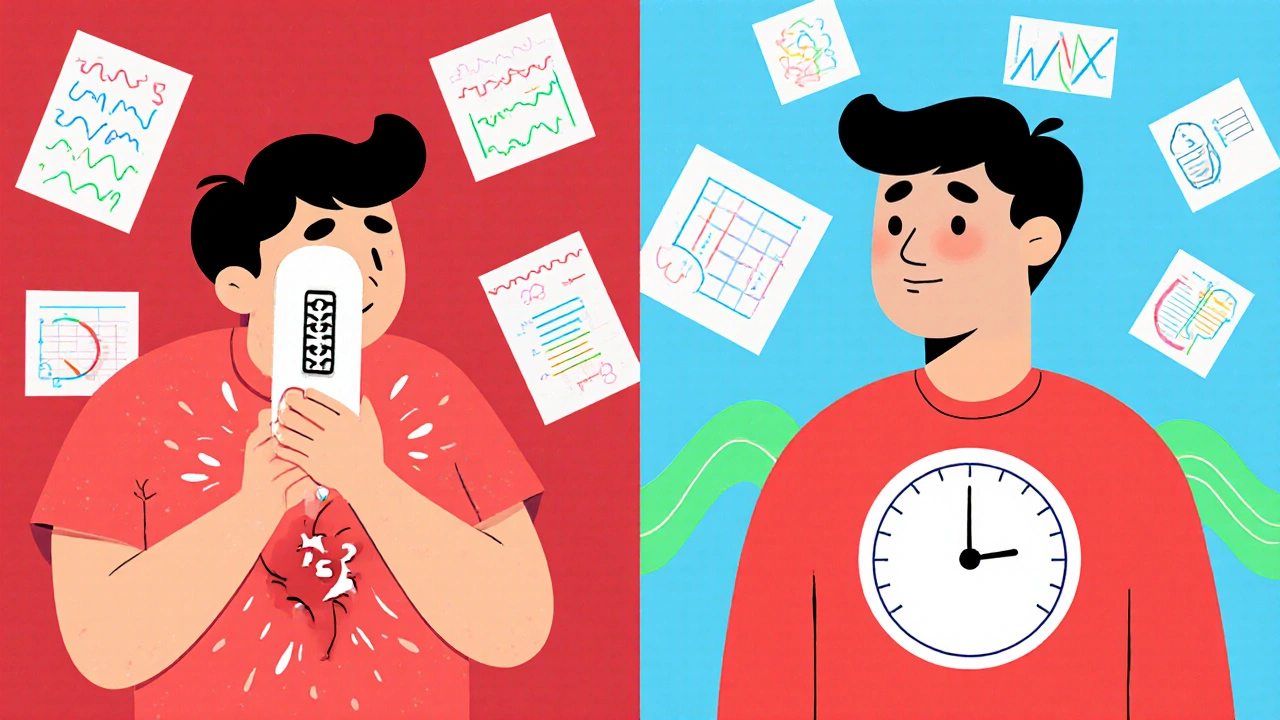
What to Do If Your Medication Is Causing Anxiety
Don’t stop cold turkey. Abruptly quitting steroids, ADHD meds, or thyroid drugs can cause rebound anxiety, panic, or even seizures.Instead, work with your doctor. Here are the most effective steps:
- Lower the dose. For ADHD meds, starting at half the usual dose and increasing slowly cuts anxiety risk by 65%. For thyroid meds, a 12.5 mcg reduction can make all the difference.
- Switch medications. If you’re on Adderall and it’s making you anxious, try Vyvanse-it releases more slowly. If you’re on albuterol, ask about a long-acting inhaler like formoterol. For asthma, some patients switch to montelukast (Singulair), which doesn’t affect the nervous system.
- Try non-stimulant ADHD options. Atomoxetine (Strattera) doesn’t trigger anxiety like stimulants. It’s slower to work but gentler on the nerves.
- Monitor thyroid levels. Get your TSH checked every 6-8 weeks after a dose change. Aim for 0.4-4.0 mIU/L. Levels above 4.0 often mean too much levothyroxine.
- Taper corticosteroids slowly. If you’re on prednisone for more than two weeks, your doctor should create a taper plan. Stopping too fast can cause adrenal crash and severe anxiety.
Some people find relief with short-term cognitive behavioral therapy (CBT). Studies show CBT helps 60-70% of patients manage anxiety while adjusting meds. It doesn’t fix the chemical trigger-but it gives you tools to ride out the wave.
Prevention Is Possible
You don’t have to wait until you’re spiraling to act.- If you have a history of anxiety, tell your doctor before starting any new medication.
- Ask: "What are the mental health side effects?" Not just "What are the side effects?"-be specific.
- Request the lowest effective dose, especially for steroids, stimulants, and decongestants.
- Ask about alternatives. For example, pseudoephedrine-free cold meds exist-like phenylephrine (though less effective) or saline sprays.
- Get blood tests before and after starting thyroid or steroid meds. Baseline data helps spot changes.
One patient on ADDitude Magazine’s forum switched from Adderall to Vyvanse at half the dose. Her anxiety dropped by 70% in two weeks. That’s not luck. That’s smart prescribing.
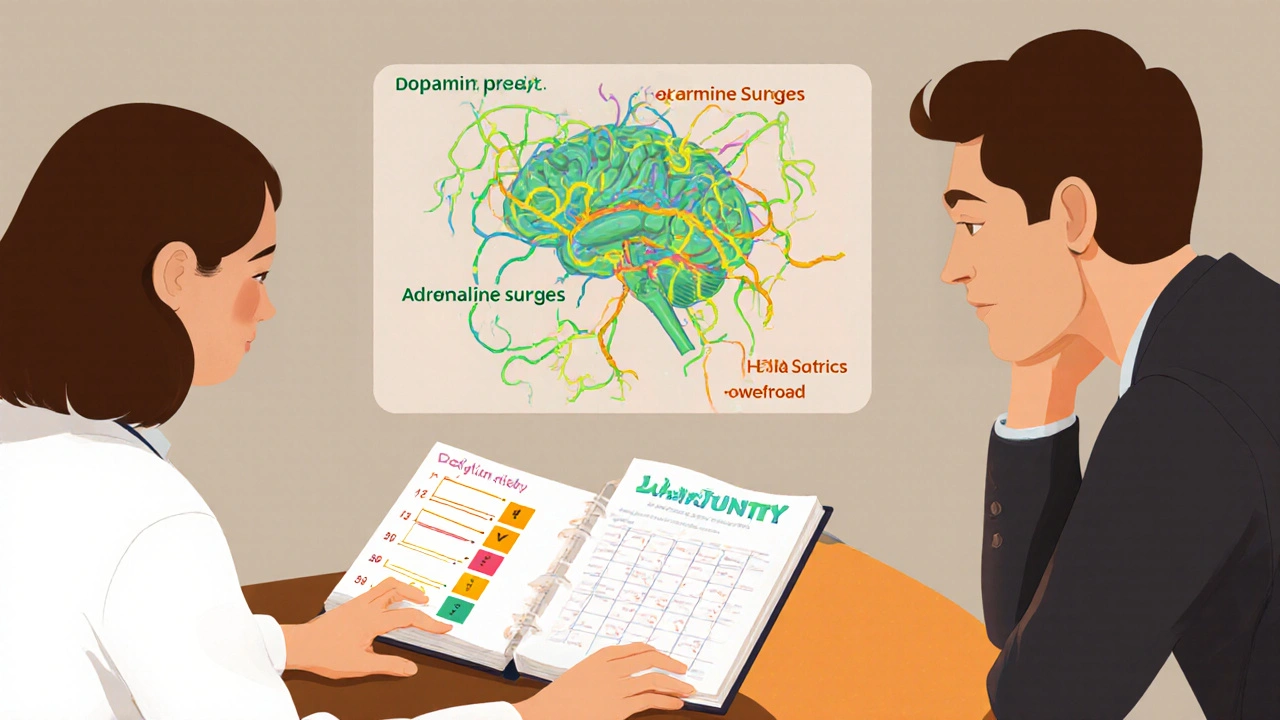
When to Seek Help
If you’re having:- Panic attacks with chest pain or dizziness
- Thoughts of self-harm or suicide
- Difficulty breathing or heart rate over 120 bpm at rest
-go to urgent care or call emergency services. These aren’t normal side effects. They’re medical events.
For milder symptoms, schedule an appointment with your prescriber within a week. Bring your symptom journal. Say: "I think this medication is causing my anxiety. Can we review it?"
Most doctors want to help. They just need the right information. You’re not overreacting. You’re being proactive.
What’s Next?
Researchers are working on genetic tests to predict who’s at risk for medication-induced anxiety. The National Institute of Mental Health is funding $2.3 million in studies to identify biomarkers that could one day guide personalized prescriptions.In the meantime, you have power. You know your body. You’ve felt the difference between a normal side effect and something that feels like your mind is breaking. Trust that. Speak up. And don’t accept anxiety as just "part of the treatment."
Medications are tools-not punishments. If one’s making you worse, it’s not your fault. It’s a mismatch. And mismatches can be fixed.
Can anxiety from medication go away on its own?
Yes, in most cases. Medication-induced anxiety usually fades within days to weeks after stopping or lowering the dose. For short-acting drugs like albuterol or pseudoephedrine, symptoms often clear in 24-48 hours. For longer-acting drugs like prednisone or ADHD stimulants, it may take 2-4 weeks. If anxiety lasts longer than a month after stopping the drug, it may be a separate condition that needs its own treatment.
Is it safe to stop a medication if it’s causing anxiety?
Never stop abruptly, especially with steroids, seizure meds, or antidepressants. Sudden withdrawal can cause rebound anxiety, seizures, or adrenal crisis. Always talk to your doctor first. They can create a safe tapering plan. For example, prednisone is usually reduced by 5 mg every few days, not stopped cold.
Can over-the-counter drugs cause anxiety too?
Yes. Decongestants like pseudoephedrine (Sudafed), weight-loss supplements with caffeine or ephedrine, and even high-dose energy drinks can trigger anxiety. Some herbal supplements like ginseng, kava, or bitter orange may also increase nervousness. Always check labels for stimulants.
Why do some people get anxiety from a drug and others don’t?
It comes down to genetics, metabolism, and brain chemistry. Some people have slower liver enzymes (like CYP2D6), which means drugs build up in their system. Others have more sensitive nervous systems or a history of anxiety, making them more reactive. Even small differences in receptor sensitivity can make one person feel jittery while another feels fine on the same dose.
How long should I wait before deciding a medication is causing anxiety?
If symptoms start within days of beginning a new drug, it’s likely related. For drugs with slow buildup (like thyroid meds), give it 2-4 weeks. If anxiety peaks around the same time each day-right after taking the pill-that’s a strong clue. Don’t wait months. Early intervention means faster relief.
Can therapy help with medication-induced anxiety?
Yes, especially cognitive behavioral therapy (CBT). While the medication is being adjusted, CBT helps you manage panic attacks, reduce hypervigilance, and reframe scary physical sensations. It doesn’t cure the chemical cause, but it gives you control while your body resets. Many patients find it makes the transition much easier.
Should I avoid all medications that list anxiety as a side effect?
No. Many people take these drugs without issues. The goal isn’t to avoid them-it’s to be informed. If you have risk factors (like prior anxiety, family history, or slow metabolism), ask your doctor about alternatives or lower doses. For many, the benefit outweighs the risk. But you deserve to know the trade-offs before starting.

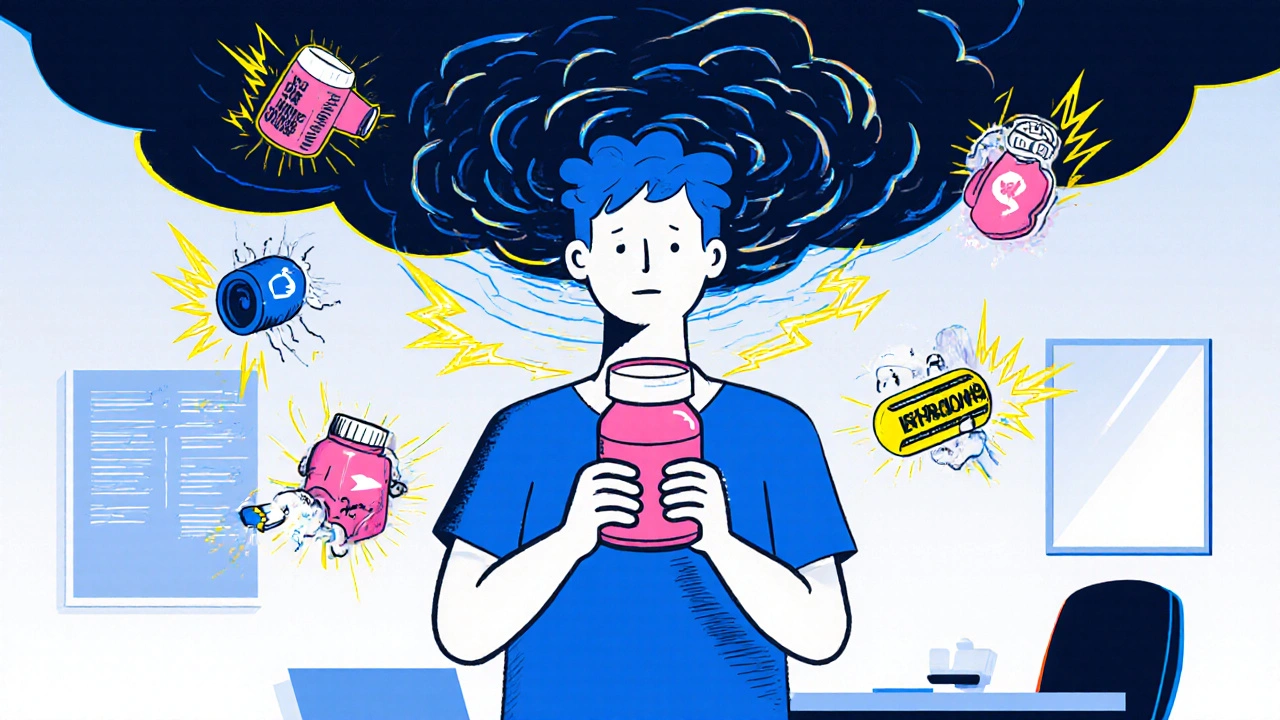

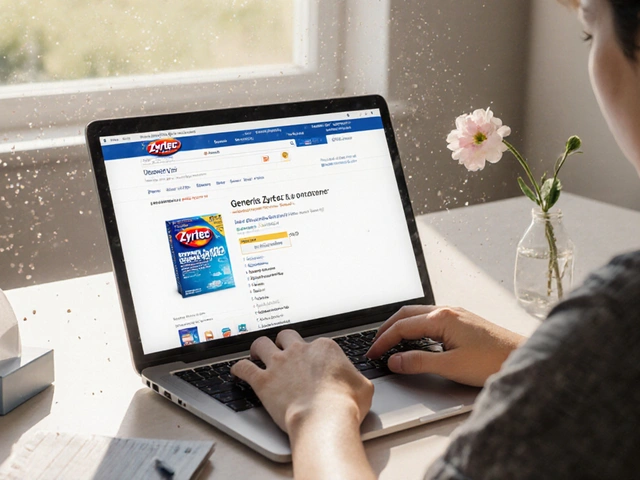
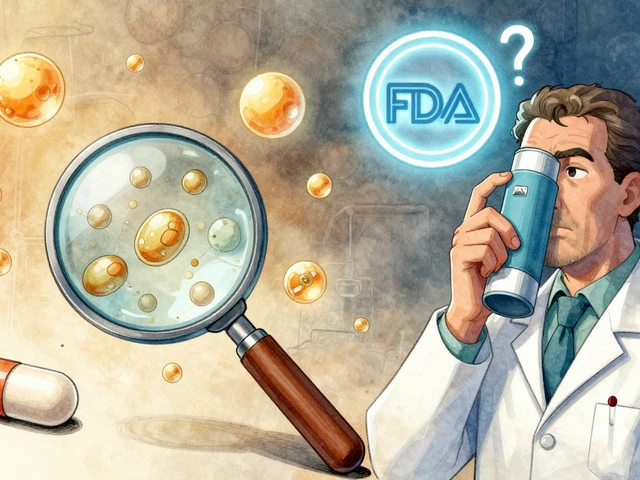
Alyssa Salazar
Okay but let’s be real-doctors treat anxiety like it’s a glitch in the system, not a biological red flag. I was on 20mg of prednisone for lupus flare and had full-blown panic attacks by day 3. My PCP said, 'Maybe you’re just stressed.' I had to bring her a PubMed link about HPA axis dysregulation before she even considered tapering. CYP2D6 poor metabolizer here-my liver’s basically a slow cooker for meds. If you’re on anything stimulant-y or steroid-based and feel like your nervous system is on fire, it’s not you. It’s the pharmacokinetics.
Beth Banham
I’ve been on levothyroxine for 8 years and never had an issue-until last year when my dose got bumped up by 25 mcg. Suddenly I couldn’t sleep, my hands shook like I’d chugged 5 espressos, and I felt this constant low-grade dread. I didn’t even connect it to the med until I started tracking my symptoms. Got my TSH checked-was at 0.1. Dropped back to original dose and within 10 days, I felt like myself again. Sometimes it’s not ‘anxiety disorder’-it’s just a number out of range.
Brierly Davis
Y’all are not alone. I was on Adderall for ADHD and felt like I was vibrating inside my skin. Went from 20mg to 10mg, switched to Vyvanse at 30mg, and boom-no more panic attacks. Also started daily walks and breathing exercises. Not magic, but it helped me chill while my brain adjusted. Your body’s not broken. The script just didn’t fit. Talk to your doc, don’t suffer in silence 😊
Jim Oliver
Wow. So, you took a pill. Then you felt bad. Then you blamed the pill. Groundbreaking. Do you also blame your shoes when your feet hurt? Maybe you’re just an anxious person who found a convenient scapegoat. Also, ‘CYP2D6’? You sound like you read one Medscape article and now you’re a neuropharmacologist. Stop self-diagnosing. Go see a therapist. Or better yet-stop taking everything that isn’t FDA-approved for your personality disorder.
William Priest
lol so if u take sudafed and feel wired its the drugs fault? maybe u r just a nervous wreck who needs to chill the f*** out. also who the hell still uses 'levothyroxine' instead of 'synthroid'? try not being a medical nerd for once. also why are u keeping a journal? are u writing a book? i dont need a 10 page report to know i dont like feeling like a jittery hamster
Ryan Masuga
Hey, I get it. I was on albuterol for asthma and thought I was having anxiety attacks-turns out, it was just the inhaler. My heart was racing, I couldn’t sit still, and I was convinced I was losing it. Took me weeks to realize it was the med. Once I switched to formoterol and cut back on the frequency, everything calmed down. Don’t feel dumb for noticing this. Most docs don’t even mention these side effects. You’re doing the right thing by paying attention. Keep tracking, keep asking. You’re not crazy-you’re just paying attention.
Jennifer Bedrosian
OMG I thought I was going insane!! I was on prednisone for eczema and I cried for no reason every night and felt like someone was squeezing my chest. I told my dermatologist and she was like 'oh that's normal' and I was like NO IT IS NOT NORMAL I FEEL LIKE I'M DROWNING IN MY OWN SKIN. I finally told her I was gonna stop it cold turkey and she panicked and gave me a taper plan. I'm on day 5 of tapering and already feel like a human again. Don't let anyone gaslight you. Your body talks. Listen.
Lashonda Rene
So I just wanna say I used to think anxiety was all in your head until I started taking that asthma inhaler and literally couldn’t sleep for three nights and kept jumping at every sound and I thought I was having a nervous breakdown but then I read somewhere that albuterol can do that and I asked my doctor and she said oh yeah that’s a thing and we can switch you to something else and now I’m fine. I didn’t know meds could do that. I thought only bad thoughts or trauma caused anxiety. Turns out your body just reacts differently to chemicals and that’s okay. I’m glad I didn’t just blame myself. You’re not weak. You’re just sensitive to stuff. And that’s not a flaw. It’s just how you’re made.
Andy Slack
Just wanted to say-this post saved me. I’ve been on Vyvanse for 3 years and thought my anxiety was just part of being a high-strung adult. Last month I dropped my dose by 20% and suddenly I could breathe again. No more racing thoughts at 3am. No more panic when the microwave dinged. I didn’t need to be fixed. I just needed to be dosed right. You’re not broken. You’re just a human with a nervous system that reacts to chemistry. That’s not a flaw. That’s biology. And you deserve to feel safe in your own skin.
Rashmi Mohapatra
u people are so dramatic. in india we take steroids for weeks and no one has anxiety. u just weak. maybe u need yoga not more pills. also why u always blame med? u just scared of life. if u feel nervous then sit quiet and meditate. no need to change ur med. ur brain is weak. u need to train it not find excuse
Abigail Chrisma
Thank you for writing this. I’m a nurse and I see this all the time-patients dismissed because their anxiety doesn’t fit the textbook. I had a 14-year-old girl on albuterol who thought she was having panic attacks. Turned out it was the inhaler. We switched her to a nebulizer with lower dose and she cried because she finally felt normal again. You’re not overreacting. You’re not weak. You’re not broken. You’re a human being whose body is communicating. And you deserve to be heard. Keep speaking up. We’re listening.